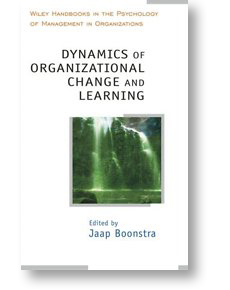Thinking about Change: Complexity and Multiplicity in Change Processes
In: J. Boonstra (ed): Dynamics in Organizational Change and Learning - Wiley, 2004
Given that more organizational change takes place unplanned than planned and more unsuccessful than successful, we think there is justification for reflection on why change does not work. This implies complexifying things rather than simplifying them: to search for hidden rules of the game, for informal processes, political mechanisms in organizations, etc. In the first section of this chapter we do just that. We discuss eight mini theories about irrationalities. An underlying message of this section is also that over-realiance on rational, top-down, and contingency approaches can be rendered fruitless as a result of such irrationalities.
This leads to the second section where we reflect on the question what makes change work. For this, we explore five prevailing paradigms about change, each associated with certain beliefs and assumptions and characterize each in terms of their characteristics, such as predictability, ideals, pitfalls, style of change agent, and so on. These five paradigms, each typified by a color, cover most change processes we see in real life and the theories about them in literature. The message of this section is that the existence of such multiple approaches can help organizations deal with complexity.
The chapter is a contribution to the book ‘Dynamics of Organizational Change and Learning’ that addresses the behavior of individuals, and the social processes in groups and organizations during the process of change. Leading authorities from nine countries discuss the processes, problems, and successes of organizational change and learning, and offer critical reflections on the conventional wisdom of planned change. These include Stewart Clegg, Thomas Cummings, Karl Weick and Luc Hoebeke. The book combines proven knowledge and robust theories of organizational change and learning with new perspectives from social constructionism and postmodern organization theories. It is a source of knowledge and inspiration for organizational professionals, management consultants, academics, and students.







